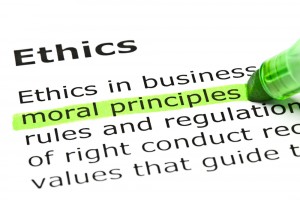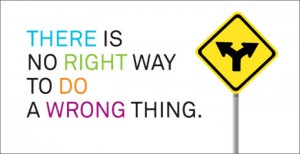What is Ethical Writing?______________________________________
Ethical writing means doing what is right and fair. Some common phrases used reflect public trust, equal opportunity employer, core values, honest advertising, full disclosure, fair trade and social responsibility.
Ethics has mainly been thought of as something that is related to someone’s personal life. Conversely, it does apply to the business side of things. In the workplace, having ethics may be frowned upon because business is looked at doing what is right for the bottom line and not doing what is right for the company.
There is really no differentiation between personal ethics and workplace ethics. In the end, ethics is all about making choices that may not always feel good or benefit you. Regardless of individual values, ethical principles in the workplace set common workplace values. Ethical decisions are considered to be the right decisions and great examples to live by daily. By having this mutual understanding helps to create greater efficiency and productivity.
Ethical Requirements on the Job___________________________________________
- Respect co-workers, and customers in conduct that avoids bullying, discrimination, or other unprofessional actions.
- Wording that avoids false claim
- Refuse to use language that makes false claims or tries to deceive readers.
- Avoid language that excludes others on the basis of gender, race, national original, religion, age, physical ability, or sexual orientation.
- Maintain accurate and current records at work.
- Comply with all local, state and federal regulations to insure a safe, healthy work environment, products, and services.
- Adhere to your professions code or standards of ethics.
- Follow your company’s policies and procedures.
- Respect all copyright obligations and privileges.
Ethical Conduct_________________________________________________________
 Ethical conduct in the workplace encourages a culture of making decisions on ethics. It helps enhance accountability and transparency when undertaking any business decisions. During hard times, a strong ethical culture will guide businesses in managing such conflicts by making the right moves. Ethical conduct within the business alleviates the staff on how to act consistently even in difficult times. Examples of reaching ethical decisions include:
Ethical conduct in the workplace encourages a culture of making decisions on ethics. It helps enhance accountability and transparency when undertaking any business decisions. During hard times, a strong ethical culture will guide businesses in managing such conflicts by making the right moves. Ethical conduct within the business alleviates the staff on how to act consistently even in difficult times. Examples of reaching ethical decisions include:
- Following your conscience and being true to yourself.
- Be suspicious of convenient and false appeals that go against your beliefs.
- Meet your obligations to your employer, co-workers, your customers, and the global community.
- Take responsibility for your actions.
- Honor confidentiality at work.
- Document your work completely, carefully and honestly.
- Keep others in the loop.
- Treat company property respectfully.
- Think green
- Weigh all sides before committing to a conclusion.
Ethical writing is a reflection of ethical practice. It’s clear, accurate, fair and honest. In today’s fast-paced world, many employees rely on emails and text messages to get their professionalism and personality across. The briefest written exchange may appeal or harm the other person, and could also create or rupture a personal relationship. Everyone is their own referee for whether they are writing ethically or not. Writers becoming more aware of their own motivations for writing will help them accurately evaluate if they are writing ethically.
